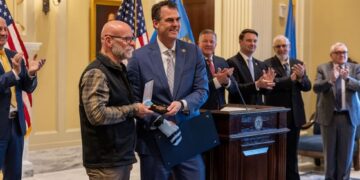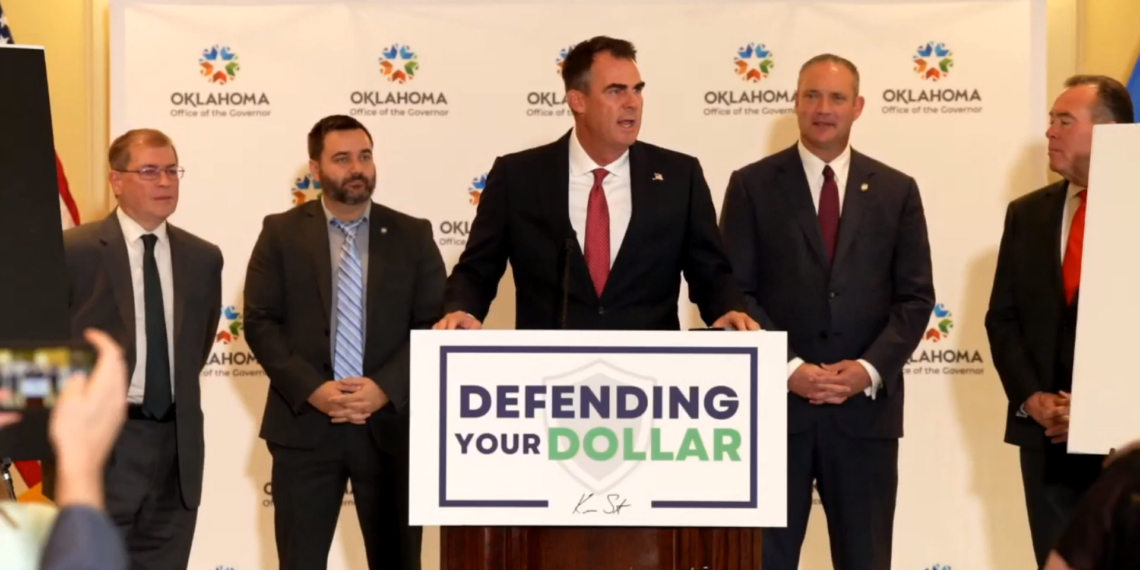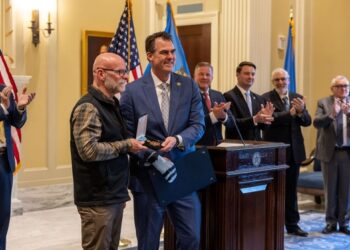OKLAHOMA CITY (OBV) – Gov. Kevin Stitt’s hopes for an income tax cut and a “tax fairness” measure were stalled Tuesday when the Oklahoma Senate adjourned its special session sine die. Senate Pro Tempore Greg Treat criticized Stitt for not showing up before the Senate to defend his tax measures.
Stitt issued Executive Order 2023-23 in September, calling upon the Oklahoma Legislature to go into special session and implement a tax cut that would lead to zero income taxes, a “tax fairness” law and a measure that increases transparency in the state budget process.
The legislature convened the special session Tuesday morning, but the Senate’s session was over by 2:30 p.m. after the Senate Caucus voted to adjourn and not resume.
Stitt started the day in good spirits, expressing optimism about his tax and budget measures during a news conference. Oklahoma House of Representatives Speaker Charles McCall, State Treasurer Todd Russ and Grover Norquist, the founder of Americans for Tax Reform, flanked Stitt during the 9:30 a.m. news conference.
“It’s a great day for Oklahomans that we’re going to be talking about tax cuts and smaller government,” Stitt said during the news conference. “Getting these things over the finish line are going to be wonderful for all four million Oklahomans to slow the growth of government.”
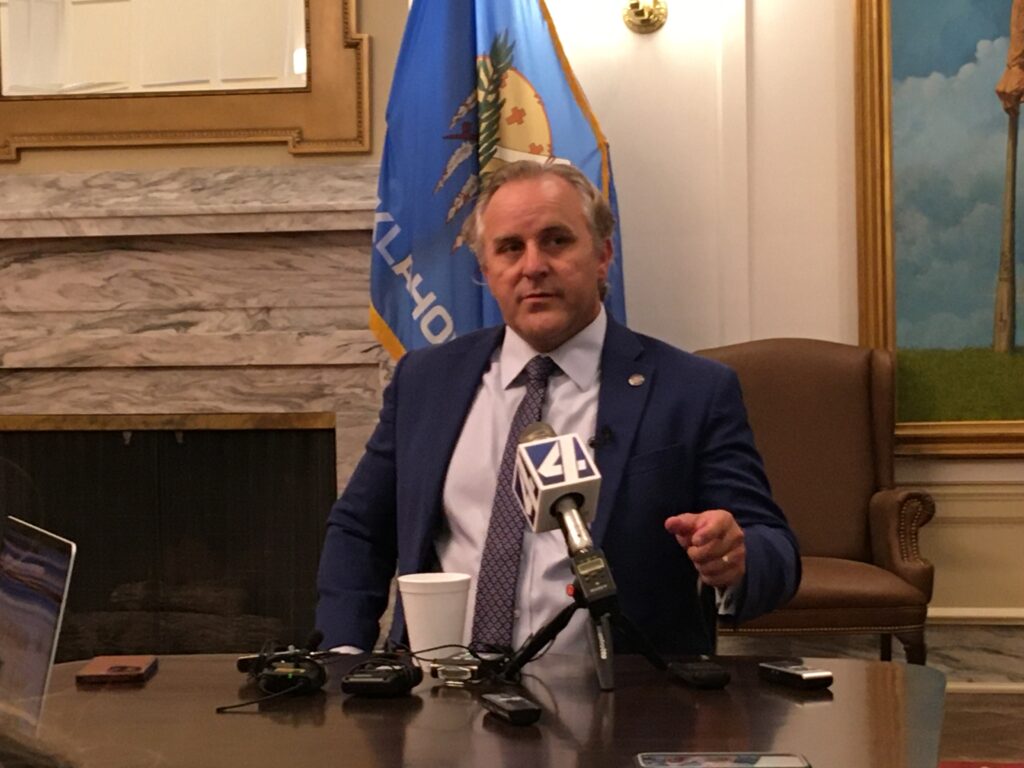
Treat, R-Oklahoma City, spoke to the media after the Senate adjourned sine die, and sharply criticized Stitt for not coming before the Senate to present and defend his proposed measures. Treat said he did not know if the Senate would adjourn sine die because he had heard that Stitt would possibly speak to the Senate.
“I walked into leadership at 8 a.m. this morning and told them that if the governor showed up at 10 a.m., we would have to stay around and hear him out and stay in session,” Treat said. “We wanted to give the governor the benefit of doubt that he would actually show up. [I’m] very disappointed that he chose not to. It’s not like he was out of the country. It’s not like he was out of the state. He was downstairs – he was three floors down – holding the press conference that he called, obviously, after we invited him. We even held up the start of the appropriations and budget meeting to afford him the opportunity to slam us for a while downstairs and then come upstairs and present his plan.”
Stitt’s executive order asked the legislature to pass the following measures during special session:
- A trigger law mandating that if a state or federal court finds that certain individuals do not have to pay a state tax due to their race, heritage or political classification, then no Oklahoman will have to pay the tax.
- A tax cut that puts Oklahoma on the path to zero income taxes to keep the state in line with surrounding Republican-led states.
- A measure that increases budget transparency to ensure that Oklahomans and their elected representatives are able to see how their taxpayer dollars are being spent.
The Senate began the special session at 10 a.m. The House started at 11 a.m. Treat said Stitt’s staff contacted him by text message and notified him that Stitt would not speak to the Senate. Treat essentially described Stitt’s decision as a deal breaker, saying that after he received the text message, he went up to Sen. Roger Thompson, R-Okemah, and told him, “It’s time to move on. He’s not going to be here.”
Treat blasted Stitt for speaking to the Senate in an open meeting, and accused him of misrepresenting the frequency of their interactions
“It’s the height of irony and hypocrisy to put in a call for budget transparency and then say, ‘I’m willing to meet behind closed doors with your caucus, but I’m not willing to meet in an open meeting,'” Treat said. “To be clear, and abundantly clear, [and] transparent with you, he has not requested from myself or the caucus chair a meeting with our caucus. He also has insinuated that him and the speaker and I continue to meet every Tuesday. That is not true. We meet on Tuesday during session – during session only. We have not met since May.”
Oklahoma Business Voice emailed Stitt’s office and requested a response to Treat’s criticisms. Abegail Cave, director of communications for Stitt, emailed OBV a response, saying Senate leadership is hindering Stitt from helping Oklahomans save money.
“The Governor has been clear. He wants a quarter point tax cut and to slow the growth of government. Senate leadership is denying Oklahomans their right to keep their hard earned money while continuing to increase the size of government every year,” Cave said.
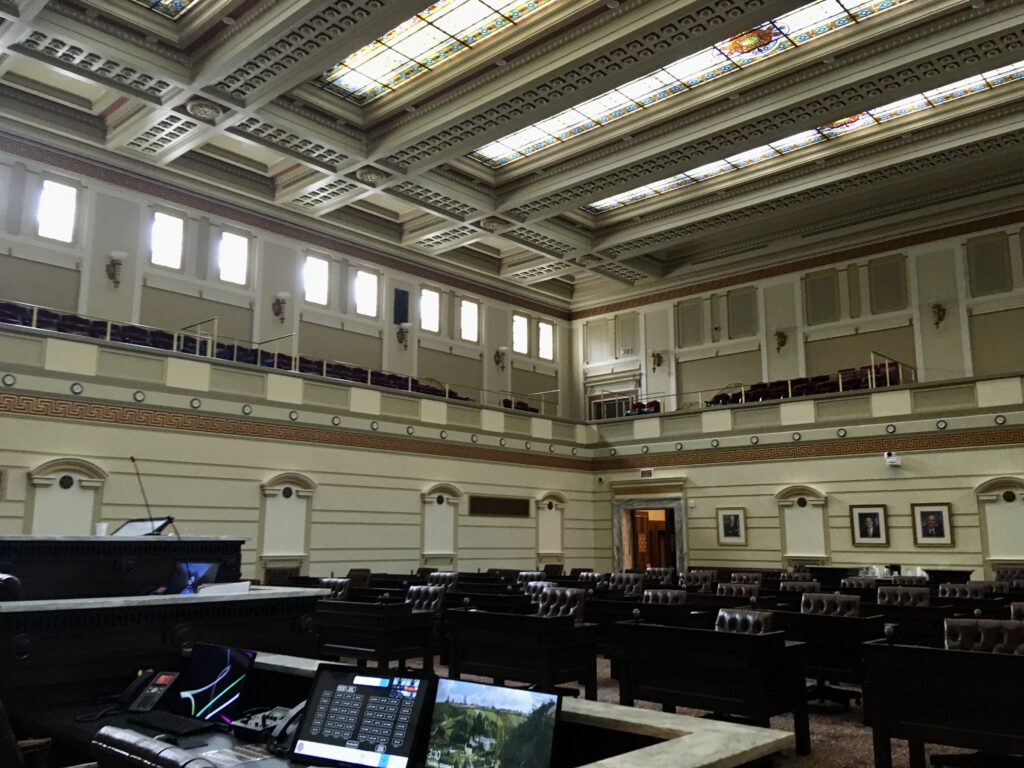
Treat accused Stitt of a lack of meaningful communication and being inconsistent when it comes to spending.
“I don’t know what the governor really wants other than what he tweets and what he told you all,” Treat said. “I saw his plan: cut spending and cut taxes. I have yet to see him present a budget that does the first part of that. He, this most recent year, presented the largest executive budget of any governor in state history. We were hoping we could ask him some questions today. I had told the caucus, ‘We must be respectful. We must be on point about the special session call and nothing else.'”
Treat said he and his colleagues in the Senate do want income tax reform.
“We want reform and we have advocated for it. The difficult part about it is, ‘What reform do you want?’ That is very hard to come up with. We have been studying for roughly 16 months and there’s not a consensus on the best way to do it,” Treat said. “Oklahoma’s overall tax burden on our citizens is already in the top 10. According to the Tax Foundation, we’re doing quite well, relatively speaking. We want to cut income tax, but we want to do it in a way that’s responsible and takes into account what we’ve done on school choice recently and historic investments we’ve made.”
The Tax Foundation’s 2023 State Business Tax Climate Index ranked Oklahoma 31st in the nation when it comes to individual income tax competitiveness.
An undesirable individual income tax rate can harm a state’s ability to attract workers, according to Janelle Fritts, columnist for the Tax Foundation, which produces the State Business Tax Climate Index.
“Even traditional C corporations are indirectly impacted by the individual income tax, as this tax influences the location decisions of individuals, potentially impacting the state’s labor supply, and higher individual income taxes increase the price of labor,” Fritts said.
Oklahoma’s individual income tax system has six income tax brackets ranging from 0.5 percent to 4.75 percent for top earners. The 4.75 percent rate kicks in at a $7,000 annual income.
All Oklahomans and more than 95 percent of businesses in the state pay the individual income tax. The income tax’s standard deduction is $6,350 for single filers and $12,200 for joint filers.
The House is still in special session. Any tax measurers passed in the House during special session will be held for the regular 2024 legislative session.
Treat said he does not yet know how much of a priority cutting the income tax and presenting a tax plan will be for him and his Senate colleagues in the next legislative session.
“It’s a heavy lift. There’s a reason that Frank Keating, Brad Henry, Mary Fallin and Kevin Stitt haven’t been able to deliver on like a move to electric consumption tax – it’s death by a thousand cuts,” Treat said. “You start getting certain people saying, ‘Hey, we shouldn’t do this, should do that.’ We all in theory have agreed to varying degrees that we should. And they haven’t been able to deliver on it because it’s hard to get to an agreement on it and make sure that you have more winners then losers, because there’s losers in anything you do.”
Treat said his priority in the next session will be to get budget transparency done right and on the Senate’s terms.
“I want to leave Oklahoma better than I found it, and, to the to the extent that I can control that, I’m going to fight even if it’s not popular to make sure that we have a sustainable path,” he said.




